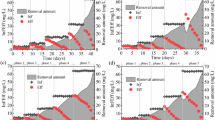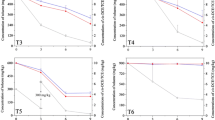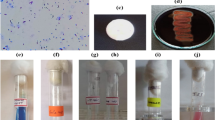Abstract
A series of batch experiments was undertaken to explore the influence of growth conditions on the extracellular polymeric substances (EPS) production of five representative strains of trichloroethylene (TCE) degrading toluene oxidizing bacteria of importance to in situ bioremediation. EPS production for three distinct carbon sources (i.e., lactate, glucose, and toluene) was examined under starvation and non-starvation conditions. EPS extraction was accomplished using DOWEX™ (cation exchange resin; CER), and total carbohydrate, protein, and uronic acid were quantified as the main EPS constituents. Experimental results reveal that most bacteria grown on toluene synthesized more EPS per colony forming unit (CFU) than those grown on other substrates and that EPS production is enhanced with increasing length of starvation. These observations suggest that EPS may be produced under conditions of environmental stress and may be linked to enzyme deactivation. The results from this work additionally indicate that the mutant strain of Ralstonia pickettii PKO1 with the lack of gene encoding TbuX (an outer membrane protein) is more hydrophobic due to less EPS synthesis ability. The relatively lower amount of EPS synthesis in the mutant strain of R. pickettii PKO1 suggests that TbuX, an outer membrane protein encoded a part of the toluene catabolic regulation of R. pickettii PKO1, has a role in bacterial EPS production.





Similar content being viewed by others
References
Aakra A, Hesselsoe M, Bakken LR (2000) Surface attachment of ammonia-oxidizing bacteria in soil. Microb Ecol 39:222–235
Abu-Lail NI, Camesano TM (2003) Role of lipopolysaccharides in the adhesion, retention, and transport of Escherichia coli JM109. Environ Sci Technol 37:2173–2183
Amy PS, Morita RY (1983) Protein patterns of growing and starved cells of marine-vibrio sp. Appl Environ Microbiol 45:1748–1752
Boylen CW, Ensign JC (1970) Intracellular substrates for endogenous metabolism during long-term starvation rod and spherical cells of Arthrobacter crystallopoietes. J Bacteriol 103:578–587
Christensen BE, Kjosbakken J, Smidrod O (1985) Partial chemical and physical characterization of two extracellular polysaccharides produced by marine periphytic Pseudomonas sp. strain NCMB2021. Appl Environ Microbiol 50:837–845
Costerton JW, Stewart PS, Greenberg EP (1999) Bacterial biofilms: a common cause of persistent infections. Science 284:1318–1322
Dubois M, Gilles KA, Hamilton JK, Rebers PA, Smith F (1956) Colorimetric method for determining of sugars and related substances. Anal Chem 28:350–356
Ensley BD (1991) Biochemical diversity of trichloroethylene metabolism. Ann Rev Microbiol 45:283–299
Findlay RH, White DC (1983) Polymeric beta-hydroxyalkanoates from environmental samples and B. megaterium. Appl Environ Microbiol 45:71–78
Fishman A, Tao Y, Wood TK (2004) Toluene 3-monooxygenase of Ralstonia pickettii PKO1 is a para-hydroxylating enzyme. J Bacteriol 186:3117–3123
Frolund B, Keiding K (1994) Implementation of an HPLC polystyrene divinylbenzene column for separation of activated sludge exopolymers. Appl Environ Microbiol 41:708–716
Frolund B, Keiding K, Nielsen PH (1994) A comparative study of biopolymers from a conventional and an advanced activated sludge treatment plant. Water Sci Technol 29:137–141
Frolund B, Palmgren R, Keiding K, Nielsen PH (1996) Extraction of extracellular polymers from activated sludge using a cation exchange resin. Water Res 30:1749–1758
Geesey GG (2001) Bacterial behavior at surfaces. Curr Opin Microbiol 4:296–300
Gehr R, Henry JH (1983) Removal of extracellular material: techniques and pitfalls. Water Res 17:1743–1748
Gibson DT, Hensley M, Yoshioka H, Mabry TJ (1970) Formation of (+)-cis-2,3-dihydroxy-1-methylcyclohexa-4,6-diene from toluene by Pseudomonas putida. Biochemistry 9:1626–1630
Gibson TL, Abdul AS, Olsen RH (1988) Microbial degradation of aromatic hydrocarbons in hydrogeologic material: microcosm studies. In: Proceedings of the Second National Outdoor Action Conference on Aquifer Restoration Groundwater and Geophysical Methods. National Water Well Association, OH, pp 53–69
Harvey RW, Smith RL, George L (1984) Effect of organic contamination upon microbial distributions and heterotrophic uptake in a Cape Cod, Mass., aquifer. Appl Environ Microbiol 48:1197–1202
Heald S, Jenkins RO (1994) Trichloroethylene removal and oxidation toxicity mediated by toluene dioxygenase of Pseudomonas putida. Appl Environ Microbiol 60:4634–4637
Hopkins GD, McCarty PL (1995) Field Evaluation of in situ aerobic cometabolism of trichloroethylene and three dichloroethylene isomers using phenol and toluene as the primary substrates. Environ Sci Technol 29:1628–1637
Howard PH (1990) Handbook of environmental fate and exposure data for organic chemicals. Lewis Publishers, Chelsea
Jahn A, Nielsen PH (1995) Extraction of extracellular polymeric substances (EPS) from biofilms using a cation exchnage resin. Biofilm Struct Growth Dyn 32(8):157–164
Johnson DR, Park J, Kukor KK, Abriola LM (2006) Effect of carbon stavation on toluene degradation activitu by toluene monooxygnease-expressing bacteria. Biodegradation 17:437–445
Karapanagiotis NK, Rudd T, Sterrit RM, Lester JN (1989) Extraction and characterization of extracellular polymers in digested sewage sludge. J Chem Technol Biotechnol 44:107–120
Kim S-Y, Kim J-H, Kim C-J, Oh D-K (1996) Metal adsorption of the polysaccharide produced from Methlobacterium organophilum. Biotechnol Lett 18:1161–1164
Kintner PK, Van Buren JP (1982) Carbohydrate interference and its correction in pectin analysis using the m-Hydroxydiphenyl method. J Food Sci 47:756–764
Kjelleberg S, Humphrey BA, Marshall KC (1983) Initial phases of starvation and activity of bacteria at surfaces. Appl Environ Microbiol 142:326–332
Leahy JG, Byrne AM, Olsen RH (1996) Comparison of factors influencing trichloroethylene degradation by toluene-oxidizing bacteria. Appl Environ Microbiol 62:825–833
Lehman RM, Cowell FS, Bala GA (2001) Attached and unattached microbial communities in a simulated basalt aquifer under fracture- and porous-flow conditions. Appl Environ Microbiol 67:2799–2809
Lovley DR (2003) Cleaning up with genomics: applying molecular biology to bioremediation. Nat Rev Microbiol 1:35–44
Malinverni, J.C. (2003) Multiple levels of regulation in toluene-3-monooxygenase containing bacterium. Ph.D. Dissertation, Rutgers University
Marshall KC (1988) Adhesion and growth of bacteria at surfaces in oligotrophic habitats. Can J Microbiol 34:503–506
Mason CA, Egli T (1993) Dynamics of microbial growth in the decelerating and stationary phase of batch culture. In: Kjelleberg S (ed) Starvation in bacteria. Plenum Press, New York, pp 81–102
McCarty PL, Goltz MN, Hopkins GD, Dolan ME, Allan JP, Kawakami BT, Carrothers TJ (1998) Full-scale evaluation of in situ cometabolic degradation of TCE in groundwater through toluene injection. Environ Sci Technol 32:88–100
McLean RJ, Beauchemin D, Clapham L, Beveridge TJ (1990) Metal-binding characteristics of the gamma-glutamyl capsular polymer of Bacillus licheniformis ATCC9945. Appl Environ Microbiol 56:3671–3677
Mikesell MD, Kukor JJ, Olsen RH (1993) Metabolic diversity of aromatic hydrocarbon-degrading bacteria from a petroleum-contaminated aquifer. Biodegradation 4:249–259
Mittleman MW, Geesey GG (1985) Copper-binding characteristics of exopolymers from a freshwater-sediment bacterium. Appl Environ Microbiol 49:846–851
Morita RY (1993) Bioavailability of energy and the starvation state. In: Kjelleberg S (ed) Starvation in bacteria. Plenum Press, New York, pp 1833–1847
Nelson MJK, Montgomery SO, O’Neill EJ, Pritchard PH (1986) Aerobic metabolism of trichloroethylene by a bacterial isolate. Appl Environ Microbiol 52:383–384
Nichols PD, White DC (1989) Accumulation of poly-β-hydroxybutyrate in a methane enriched halogenated hydrocarbon degrading soil column: implication for microbial community structure and nutritional status. Hydrobiologia 176–177:369–377
Olsen RH, Hansen J (1976) Evolution and utility of a Pseudomonas aeruginosa drug resistance factor. J Bacteriol 125:837–844
Olsen RH, Kukor JJ, Kaphammer B (1994) A novel toluene-3-monooxygenase pathway cloned from Pseudomonas pickettii PKO1. J Bacteriol 176:3749–3756
Ostling J, Holmquist L, Flardh K, Svenblad B, Jouper-Jaan A, Kjelleberg S (1993) Starvation and recovery of Vibrio. In: Kjelleberg S (ed) Starvation in bacteria. Plenum Press, New York, pp 1833–1847
Park J-H, Chen Y-M, Kukor JJ, Abriola LM (2001) Influence of substrate exposure history on biodegradation in a porous medium. J Cont Hydrol 51:233–256
Park J-H, Kukor JJ, Abriola LM (2002) Characterization of the adaptive response to trichloroethylene-mediated stresses in Ralstonia pickettii PKO1. Appl Environ Microbiol 68:5231–5240
Perez-Padilla GG, Grady CPL (1998) Effects of synthetic organic chemicals on bacterial death and lysis. Water Sci Technol 37:385–393
Postgate JR (1969) Viable counts and viability. Meth Microbiol 1:611–628
Ramos JL, Duque E, Rodriguez-Herva J-J, Godoy P, Haidour A, Reyes F, Fernandez-Barrero A (1997) Mechanisms for solvent tolerance in bacteria. J Biol Chem 272:3887–3890
Rudd T, Sterrit RM, Lester JW (1983) Extraction of extracellular polymers from activated sludge. Biotechnol Lett 5:327–332
Shield MS, Montgomery SO, Chapman PJ, Cuskey SM, Pritchard PH (1989) Novel pathway of toluene catabolism in the trichloroethylene-degrading bacteria G4. Appl Environ Microbiol 55:1624–1629
Sikkema J, De Bont JAM, Poolman B (1995) Mechanisms of membrane toxicity of hydrocarbons. Microbiol Rev 59:201–222
Sutherland IW (1972) Bacterial exopolysaccharides. Adv Microb Physiol 8:143–213
Sutherland IW (1990) Biotechnology of microbial exopolysaccharides. Cambridge University Press, Cambridge, p 163
Teitzel GM, Parsek MR (2003) Heavy metal resistance of biofilm and planktonic Pseudomonas aeruginosa. Appl Environ Microbiol 69:2313–2320
Tufenkji N, Redman JA, Elimelech M (2003) Interpreting deposition patterns of microbial particles in laboratory-scale column experiments. Environ Sci Technol 37:616–623
Uhlinger DJ, White DC (1983) Relationship between physiological status and formation of extracellular polysaccharide glycocalyx in Pseudomonas atlantica. Appl Environ Microbiol 45:64–70
Vandevivere P, Kirchman DL (1993) Attachment stimulates exopolysaccharide synthesis by a bacterium. Appl Environ Microbiol 59:3280–3286
Whited G, Gibson DT (1991) Toluene-4-monooxygenase, a three-component enzyme system that catalyzes the oxidation of toluene to p-cresol in Pseudomonas mendocina KR1. J Bacteriol 173:3010–3016
Wiedemeier TH, Rifai HS, Newell CJ, Wilson JT (1999) Natural attenuation of fuels and chlorinated solvents in the subsurface. Wiley, New York, p 617
Wrangstadh M, Conway PL, Kjelleberg S (1986) The production and release of an extracellular polysaccharide during starvation of a marine Pseudomonas sp. and the effect thereof on adhesion. Arch Microbiol 145:220–227
Zylstra GJ, Wackett LP, Gibson DT (1989) Trichloroethylene degradation by Escherichia coli containing the cloned Pseudomonas putida F1 toluene dioxygenase genes. Appl Environ Microbiol 55:3162–3166
Acknowledgments
The authors acknowledge the financial support of the Superfund Basic Research Program (Grant P42-ES-04911) from the National Institute of Environmental Health Sciences. The authors also thank Juliana Malinverni for technical advice on strain PKO1.
Author information
Authors and Affiliations
Corresponding author
Rights and permissions
About this article
Cite this article
Putthividhya, A., Kukor, J.J. & Abriola, L.M. The effects of substrate exposure history and carbon starvation-induced stress on the EPS synthesis of TCE degrading toluene oxidizing soil bacteria. Environ Earth Sci 75, 775 (2016). https://doi.org/10.1007/s12665-015-5080-5
Received:
Accepted:
Published:
DOI: https://doi.org/10.1007/s12665-015-5080-5




